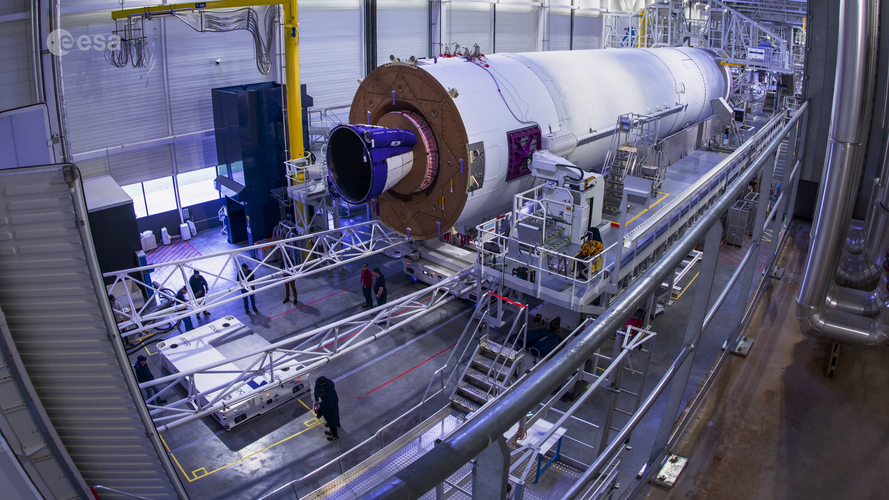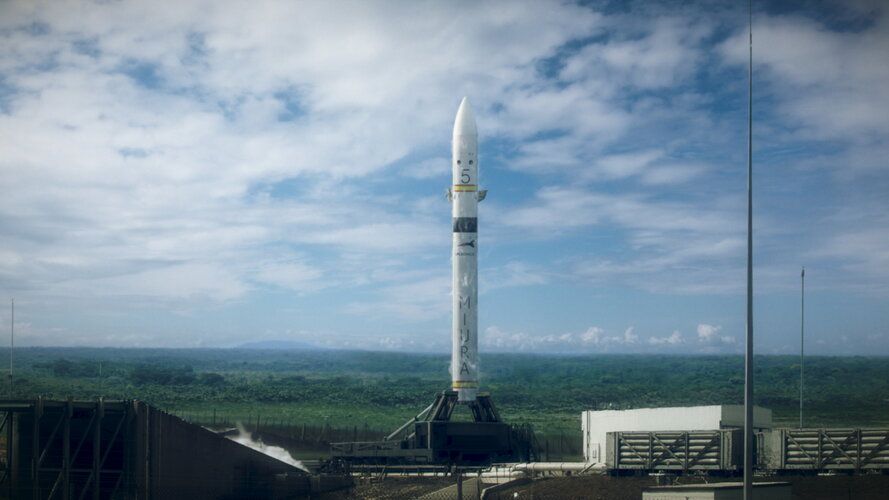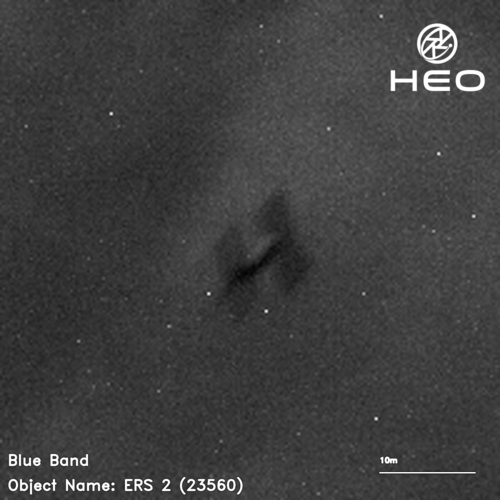Rocket on the move – Ariane 6 main stage transport timelapse
Monday, 19 February 2024 18:00 Video:
00:01:27
Video:
00:01:27
A timelapse of the main stage for the first Ariane 6 rocket as it left the ArianeGroup assembly hall in Les Mureaux, France, on 6 February 2024.
The main stage was constructed in Les Mureaux, France, at ArianeGroup’s assembly hall. After liftoff the main stage for Ariane 6 will fire its Vulcain 2.1 engine and provide steering for eight minutes on the rocket’s ascent into space.
The upper and main stage form the central core of Ariane 6 and are transported to Europe’s Spaceport in French Guiana by ship. The two stages are connected horizontally at before being transport
The place to film 'space'
Monday, 19 February 2024 05:30
It's 'Lights, camera and... action!' for ESA as the agency launches Film ESA, a dedicated film location guide.
NASA Invests in Research to Secure the Future of Space and Lunar Operations
Sunday, 18 February 2024 20:30
Los Angeles CA (SPX) Feb 18, 2024
 NASA's Office of Technology, Policy and Strategy (OTPS) has launched a significant funding initiative aimed at advancing the sustainability of activities in Earth's orbit and on the lunar surface. This new effort seeks to address the critical social, economic, and policy dimensions essential for fostering sustainable practices in space exploration and utilization.
With up to $300,000 alloc
NASA's Office of Technology, Policy and Strategy (OTPS) has launched a significant funding initiative aimed at advancing the sustainability of activities in Earth's orbit and on the lunar surface. This new effort seeks to address the critical social, economic, and policy dimensions essential for fostering sustainable practices in space exploration and utilization.
With up to $300,000 alloc
Can astronomers use radar to spot a cataclysmic asteroid?
Sunday, 18 February 2024 20:30
Los Angeles CA (SPX) Feb 18, 2024
 How can humans protect the Earth from "devastating asteroid and comet impacts?" According to the National Academies and their 2023-2032 Planetary Science and Astrobiology Decadal Survey, ground based astronomical radar systems will have a "unique role" to play in planetary defense.
There is currently only one system in the world concentrating on these efforts, NASA's Goldstone Solar System
How can humans protect the Earth from "devastating asteroid and comet impacts?" According to the National Academies and their 2023-2032 Planetary Science and Astrobiology Decadal Survey, ground based astronomical radar systems will have a "unique role" to play in planetary defense.
There is currently only one system in the world concentrating on these efforts, NASA's Goldstone Solar System
 How can humans protect the Earth from "devastating asteroid and comet impacts?" According to the National Academies and their 2023-2032 Planetary Science and Astrobiology Decadal Survey, ground based astronomical radar systems will have a "unique role" to play in planetary defense.
There is currently only one system in the world concentrating on these efforts, NASA's Goldstone Solar System
How can humans protect the Earth from "devastating asteroid and comet impacts?" According to the National Academies and their 2023-2032 Planetary Science and Astrobiology Decadal Survey, ground based astronomical radar systems will have a "unique role" to play in planetary defense.
There is currently only one system in the world concentrating on these efforts, NASA's Goldstone Solar System Unprecedented observation of magnetar glitches provides new insights into fast radio bursts
Sunday, 18 February 2024 20:30
Los Angeles CA (SPX) Feb 18, 2024
 In a breakthrough observation, two of NASA's X-ray telescopes, the Neutron Star Interior Composition Explorer (NICER) aboard the International Space Station and the Nuclear Spectroscopic Telescope Array (NuSTAR) in low Earth orbit, have offered unprecedented insights into the enigmatic fast radio bursts (FRBs) originating from deep space. This observation, focusing on a specific FRB from a known
In a breakthrough observation, two of NASA's X-ray telescopes, the Neutron Star Interior Composition Explorer (NICER) aboard the International Space Station and the Nuclear Spectroscopic Telescope Array (NuSTAR) in low Earth orbit, have offered unprecedented insights into the enigmatic fast radio bursts (FRBs) originating from deep space. This observation, focusing on a specific FRB from a known
 In a breakthrough observation, two of NASA's X-ray telescopes, the Neutron Star Interior Composition Explorer (NICER) aboard the International Space Station and the Nuclear Spectroscopic Telescope Array (NuSTAR) in low Earth orbit, have offered unprecedented insights into the enigmatic fast radio bursts (FRBs) originating from deep space. This observation, focusing on a specific FRB from a known
In a breakthrough observation, two of NASA's X-ray telescopes, the Neutron Star Interior Composition Explorer (NICER) aboard the International Space Station and the Nuclear Spectroscopic Telescope Array (NuSTAR) in low Earth orbit, have offered unprecedented insights into the enigmatic fast radio bursts (FRBs) originating from deep space. This observation, focusing on a specific FRB from a known Mavenir Demonstrates Successful NB-IoT Data Call Over Ligado's SkyTerra Satellite Network
Sunday, 18 February 2024 20:30
Los Angeles CA (SPX) Feb 18, 2024
 In a significant advancement for IoT connectivity, Mavenir, the forward-thinking network software provider, has announced the successful completion of a pioneering mobile data call in collaboration with Ligado Networks, a leader in Mobile Satellite Services in North America. This achievement marks a pivotal moment in the integration of Narrowband IoT (NB-IoT) Non-Terrestrial Network (NTN) techno
In a significant advancement for IoT connectivity, Mavenir, the forward-thinking network software provider, has announced the successful completion of a pioneering mobile data call in collaboration with Ligado Networks, a leader in Mobile Satellite Services in North America. This achievement marks a pivotal moment in the integration of Narrowband IoT (NB-IoT) Non-Terrestrial Network (NTN) techno
 In a significant advancement for IoT connectivity, Mavenir, the forward-thinking network software provider, has announced the successful completion of a pioneering mobile data call in collaboration with Ligado Networks, a leader in Mobile Satellite Services in North America. This achievement marks a pivotal moment in the integration of Narrowband IoT (NB-IoT) Non-Terrestrial Network (NTN) techno
In a significant advancement for IoT connectivity, Mavenir, the forward-thinking network software provider, has announced the successful completion of a pioneering mobile data call in collaboration with Ligado Networks, a leader in Mobile Satellite Services in North America. This achievement marks a pivotal moment in the integration of Narrowband IoT (NB-IoT) Non-Terrestrial Network (NTN) techno Mars' volcanic activity suggests Early crust recycling
Sunday, 18 February 2024 20:30
Sydney, Australia (SPX) Feb 18, 2024
 In a groundbreaking study led by Professor Joseph Michalski of The University of Hong Kong (HKU), new light has been shed on the volcanic landscape of Mars, revealing a complexity and diversity previously unrecognized. This research, recently published in Nature Astronomy, delves into the mechanisms behind Martian volcanism and its implications for understanding the geological history of Earth a
In a groundbreaking study led by Professor Joseph Michalski of The University of Hong Kong (HKU), new light has been shed on the volcanic landscape of Mars, revealing a complexity and diversity previously unrecognized. This research, recently published in Nature Astronomy, delves into the mechanisms behind Martian volcanism and its implications for understanding the geological history of Earth a
 In a groundbreaking study led by Professor Joseph Michalski of The University of Hong Kong (HKU), new light has been shed on the volcanic landscape of Mars, revealing a complexity and diversity previously unrecognized. This research, recently published in Nature Astronomy, delves into the mechanisms behind Martian volcanism and its implications for understanding the geological history of Earth a
In a groundbreaking study led by Professor Joseph Michalski of The University of Hong Kong (HKU), new light has been shed on the volcanic landscape of Mars, revealing a complexity and diversity previously unrecognized. This research, recently published in Nature Astronomy, delves into the mechanisms behind Martian volcanism and its implications for understanding the geological history of Earth a Japan successfully launches next-gen H3 rocket
Saturday, 17 February 2024 21:29
Tokyo (AFP) Feb 17, 2024
 Japan's space agency toasted a successful blast-off for its new flagship rocket on Saturday, making it third time lucky after years of delays and two previous failed attempts.
The next-generation H3 has been mooted as a rival to SpaceX's Falcon 9, and could one day deliver cargo to bases on the Moon.
"I've been in the space industry for a long time, but I've never felt so happy before, a
Japan's space agency toasted a successful blast-off for its new flagship rocket on Saturday, making it third time lucky after years of delays and two previous failed attempts.
The next-generation H3 has been mooted as a rival to SpaceX's Falcon 9, and could one day deliver cargo to bases on the Moon.
"I've been in the space industry for a long time, but I've never felt so happy before, a
 Japan's space agency toasted a successful blast-off for its new flagship rocket on Saturday, making it third time lucky after years of delays and two previous failed attempts.
The next-generation H3 has been mooted as a rival to SpaceX's Falcon 9, and could one day deliver cargo to bases on the Moon.
"I've been in the space industry for a long time, but I've never felt so happy before, a
Japan's space agency toasted a successful blast-off for its new flagship rocket on Saturday, making it third time lucky after years of delays and two previous failed attempts.
The next-generation H3 has been mooted as a rival to SpaceX's Falcon 9, and could one day deliver cargo to bases on the Moon.
"I've been in the space industry for a long time, but I've never felt so happy before, a NASA seeks candidates for yearlong simulated Mars mission
Saturday, 17 February 2024 21:29
Washington DC (UPI) Feb 16, 2024
 NASA said Friday it is seeking applicants for a simulated yearlong Mars mission.
The second of three planned ground-based missions under the Crew Health and Performance Exploration Analog (CHAPEA) program is slated for spring 2025.
The mission involves four crew members living and working inside a 1,700-square-foot, 3D-printed base at NASA's Johnson Space Center in Houston.
NASA said Friday it is seeking applicants for a simulated yearlong Mars mission.
The second of three planned ground-based missions under the Crew Health and Performance Exploration Analog (CHAPEA) program is slated for spring 2025.
The mission involves four crew members living and working inside a 1,700-square-foot, 3D-printed base at NASA's Johnson Space Center in Houston.
 NASA said Friday it is seeking applicants for a simulated yearlong Mars mission.
The second of three planned ground-based missions under the Crew Health and Performance Exploration Analog (CHAPEA) program is slated for spring 2025.
The mission involves four crew members living and working inside a 1,700-square-foot, 3D-printed base at NASA's Johnson Space Center in Houston.
NASA said Friday it is seeking applicants for a simulated yearlong Mars mission.
The second of three planned ground-based missions under the Crew Health and Performance Exploration Analog (CHAPEA) program is slated for spring 2025.
The mission involves four crew members living and working inside a 1,700-square-foot, 3D-printed base at NASA's Johnson Space Center in Houston. White House confirms Russia developing 'anti-satellite' technology
Friday, 16 February 2024 21:35
Washington DC (UPI) Feb 15, 2024
 The White House confirmed Thursday Russia is developing "anti-satellite capability" but does not currently present an immediate threat.
National Security Council spokesperson John Kirby told reporters the new development is not an active capability currently being deployed, and "though Russia's pursuit of this particular capability is troubling, there is no immediate threat to anyone's
The White House confirmed Thursday Russia is developing "anti-satellite capability" but does not currently present an immediate threat.
National Security Council spokesperson John Kirby told reporters the new development is not an active capability currently being deployed, and "though Russia's pursuit of this particular capability is troubling, there is no immediate threat to anyone's
 The White House confirmed Thursday Russia is developing "anti-satellite capability" but does not currently present an immediate threat.
National Security Council spokesperson John Kirby told reporters the new development is not an active capability currently being deployed, and "though Russia's pursuit of this particular capability is troubling, there is no immediate threat to anyone's
The White House confirmed Thursday Russia is developing "anti-satellite capability" but does not currently present an immediate threat.
National Security Council spokesperson John Kirby told reporters the new development is not an active capability currently being deployed, and "though Russia's pursuit of this particular capability is troubling, there is no immediate threat to anyone's Rocket Lab Sets Course for Historic In-Space Manufacturing Capsule Return
Friday, 16 February 2024 21:35
Los Angeles CA (SPX) Feb 16, 2024
 In a landmark decision that propels commercial space ventures into a new era, Rocket Lab USA, Inc. (NASDAQ: RKLB), a pioneer in launch and space systems, has received the green light from the Federal Aviation Administration (FAA) for a groundbreaking mission. This approval paves the way for the return of Varda Space Industries' in-space manufacturing capsule, marking the first instance the FAA h
In a landmark decision that propels commercial space ventures into a new era, Rocket Lab USA, Inc. (NASDAQ: RKLB), a pioneer in launch and space systems, has received the green light from the Federal Aviation Administration (FAA) for a groundbreaking mission. This approval paves the way for the return of Varda Space Industries' in-space manufacturing capsule, marking the first instance the FAA h
 In a landmark decision that propels commercial space ventures into a new era, Rocket Lab USA, Inc. (NASDAQ: RKLB), a pioneer in launch and space systems, has received the green light from the Federal Aviation Administration (FAA) for a groundbreaking mission. This approval paves the way for the return of Varda Space Industries' in-space manufacturing capsule, marking the first instance the FAA h
In a landmark decision that propels commercial space ventures into a new era, Rocket Lab USA, Inc. (NASDAQ: RKLB), a pioneer in launch and space systems, has received the green light from the Federal Aviation Administration (FAA) for a groundbreaking mission. This approval paves the way for the return of Varda Space Industries' in-space manufacturing capsule, marking the first instance the FAA h Pony Express 2 Mission Ready to Enhance Military Connectivity with Innovative Space Technologies
Friday, 16 February 2024 21:35
Los Angeles CA (SPX) Feb 16, 2024
 Lockheed Martin (NYSE: LMT), a global aerospace, defense, security, and advanced technologies company, has announced that its Pony Express 2 mission is ready for launch. This mission, originating from Littleton, Colorado, is a self-funded technology demonstration designed to enhance Combined Joint All-Domain Command and Control (CJADC2) capabilities through advanced space technologies.
The
Lockheed Martin (NYSE: LMT), a global aerospace, defense, security, and advanced technologies company, has announced that its Pony Express 2 mission is ready for launch. This mission, originating from Littleton, Colorado, is a self-funded technology demonstration designed to enhance Combined Joint All-Domain Command and Control (CJADC2) capabilities through advanced space technologies.
The
 Lockheed Martin (NYSE: LMT), a global aerospace, defense, security, and advanced technologies company, has announced that its Pony Express 2 mission is ready for launch. This mission, originating from Littleton, Colorado, is a self-funded technology demonstration designed to enhance Combined Joint All-Domain Command and Control (CJADC2) capabilities through advanced space technologies.
The
Lockheed Martin (NYSE: LMT), a global aerospace, defense, security, and advanced technologies company, has announced that its Pony Express 2 mission is ready for launch. This mission, originating from Littleton, Colorado, is a self-funded technology demonstration designed to enhance Combined Joint All-Domain Command and Control (CJADC2) capabilities through advanced space technologies.
The SpeQtral Unveils TarQis: a Mobile Quantum Optical Ground Station (Q-OGS)
Friday, 16 February 2024 21:35
Seoul, South Korea (SPX) Feb 16, 2024
 SpeQtral, a frontrunner in the quantum communications arena, recently announced the launch of TarQis, a cutting-edge Mobile Quantum-Optical Ground Station (Q-OGS). This innovative solution is set to democratize access to secure communication via satellite Quantum Key Distribution (QKD), a pivotal move in the realm of cybersecurity. TarQis is engineered to work in harmony with SpeQtral's forthcom
SpeQtral, a frontrunner in the quantum communications arena, recently announced the launch of TarQis, a cutting-edge Mobile Quantum-Optical Ground Station (Q-OGS). This innovative solution is set to democratize access to secure communication via satellite Quantum Key Distribution (QKD), a pivotal move in the realm of cybersecurity. TarQis is engineered to work in harmony with SpeQtral's forthcom
 SpeQtral, a frontrunner in the quantum communications arena, recently announced the launch of TarQis, a cutting-edge Mobile Quantum-Optical Ground Station (Q-OGS). This innovative solution is set to democratize access to secure communication via satellite Quantum Key Distribution (QKD), a pivotal move in the realm of cybersecurity. TarQis is engineered to work in harmony with SpeQtral's forthcom
SpeQtral, a frontrunner in the quantum communications arena, recently announced the launch of TarQis, a cutting-edge Mobile Quantum-Optical Ground Station (Q-OGS). This innovative solution is set to democratize access to secure communication via satellite Quantum Key Distribution (QKD), a pivotal move in the realm of cybersecurity. TarQis is engineered to work in harmony with SpeQtral's forthcom 


